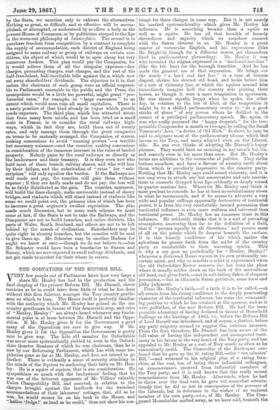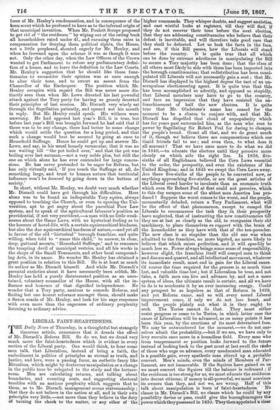THE GODFATHER OF THE REFORM BILL.
VERY few people out of Parliament know how very large a share Mr. Henley has had in the production and the final shaping of the present Reform. Bill. Mr. Disraeli, clever tactician as he is, could have done little of what he has done without this firm fulcrum amongst the Tory country gentle- men on which to lean. The House itself is perfectly familiar with the authority which Mr. Henley has gained as the one country gentleman in favour of this democratic step, and cries of "Henley, Henley !" are always heard whenever any funda- mental point is at issue between Mr. Disraeli and the Oppo- sition. If Mr. Henley gives it for the Government a good many of the Opposition are sure to give way. If Mr. Henley gives it for the Opposition the Government is pretty sure to give way. The hale old member for Oxfordshire was never more systematically yielded to, even in the Oxford- shire Quarter Sessions of which he was chairman, than he is now by our Reforming Parliament, which has with some tre- pidation gone as far as Mr. Henley, and does not intend to go farther. There is evidently a sense of security attaching in the minds of the Squires to anchoring their faith on Mr. Hen- ley. He is a squire of squires, that is one consideration. He sympathizes so much with the landowners' feeling, that he was one of the bitterest opponents of Mr. Villiers' valuable Union Chargeability Bill, and asserted, in relation to the charges brought against the landlords for the wretched accommodations of their labourers' cottages, that, old as he was, he would sooner lie on his back in the House, and "halloo 'fudge!' as loud as he could," than not show his con- tempt for these charges in some way. But it is not merely his marked squirearchicality which gives Mx. Henley his influence. He is something broader than a squire as well as a squire. He has all that breadth of homely shrewdness and sagacity which we somehow connect with the Saxon element in us. Mr. Henley is a great master of vernacular English, and his expressions (like Mr. Bright's), though for a different reason, get themselves fixed in parliamentary phraseology. Mr. Henley it was who invented the stigma expressed in a "hard-and-fast-line" (like the 10/. line) for the borough franchise. And he has made the greatest use of that expression. He brings out the words "a hard and fast line" in a tone of intense disgust, shakes his shrewd old head, and looks before him at a sort of visionary line, at which the squires around him immediately imagine half the country side putting their horses, as though it were a mere temptation to sportsmen. He was almost equally happy when he spoke, the other day, in relation to the law of libel, of the temptation it might be to a skilled parliamentary orator to "do a good stroke of abuse" of any person whom he disliked in the course of a privileged parliamentary speech. He, again, it was who really procured the "happy despatch" for the irre- pressible Compounder a month or two ago, by calling the Small Tenements' Acts, "a device of Old Nick." In short, he may be said to originate most of the parliamentary idioms which find favour on the Tory, and many adopted even on the Liberal, side. No one ever thinks of adopting Mr. Disraeli's happy phrases. They would have no meaning in any mouth but his, and scarcely even in his more than once. But Mr. Henley's terms are additions to the vernacular of politics. They strike bottom somehow, and have a flavour of country earth about them which is peculiarly impressive to the country party.
Nothing that Mr. Henley says could sound visionary, and it is not easy even to attach any but conservative and safe associa- tions to counsels dropped from lips evidently so deeply versed.
in quarter sessions' lore. Whatever Mr. Henley may think it most prudent to concede, he has at least no revolutionary views in what he recommends, and if he seems to advocate a very wide and popular suffrage apparently destructive of territorina power, it is from his very comfortable inward persuasion that territorial influence is eVen more uniform and universal than territorial power. Mr. Henley has an immense trust in this influence. He evidently thinks that it is a sort of pervading atmosphere, answering thus far to the definition of a fluid, that it "presses equally in all directions," and presses most of all on the points which lie deepest beneath the surface. It is this homely confidence of his which makes the aphorisms he grunts forth from the midst of the country party so comfortable to their wavering spirits. This is why a cry goes up periodically for "Henley, Henley !"
whenever a distressed House wavers in its own profoundly un- certain mind, and why so sensible a relief is experienced when the old Oxfordshire Nestor removes the hat from the place where it usually settles down on the back of his sententious old head, and gives forth,—not in soft-falling flakes of eloquent persuasion,—but in idiomatic Saxon gutturals, some terse and pithy judgment. From Mr. Henley's faith,—if a faith it is to be called,—at all events from his strong confidence in the deeply penetrating character of the territorial influence, has come the command- ing position to which he has attained as the sponsor, and as it were godfather, of the new Reform Bill. He had the inex- pressible advantage of having declared in favour of Household Suffrage on the hustings of 1865, i.e., before the Reform Bill of Lord Russell was introduced, and of course, a fortiori, before any party exigency seemed to suggest this extreme measure. From the first, therefore, Mr. Disraeli has been aware of the full value of having this independent and unsuspected testi- mony in his favour at the very heart of the Tory party, and has appealed to Mr. Henley as a sort of Tory oracle as often as he conveniently could. The Chancellor of the Exchequer con- fessed that he gave up the 6/. rating Bill,—the "ten minutes' Bill,"—and returned to his original plan of a rating fran- chise, at the cost, too, of losing three influential colleagues, on remonstrances received from influential members of the Tory party, and it is well known that this really meant remonstrances from Mr. Henley. Afterwards, when he had to throw over the dual vote, he gave out somewhat ostenta- tiously that he did so not in consequence of the pressure of the Liberals, but in deference to the wishes of an eminent member of his own party,—i.e., of Mr. Henley. The Com- pound Householder melted away, as we have said, beneath the
force of Mr. Henley's condemnation, and in consequence of the keen scent which he professed to have as to the infernal origin of that municipal invention. When Mr. Poulett Scrope proposed
to -get rid of "the residuum" by wiping out of the rating book all householders rated under V., and excusing them rates in
compensation for denying them political rights, the House, not a little perplexed, shouted eagerly for Mr. Henley, and when he frowned upon the scheme it was as though it were not. Only the other day, when the Law Officers of the Crown wanted to get Parliament to refuse any parliamentary defini- tion of a house, and to leave the definition to the Law Courts, Mr. Henley's suggestion that he should like those func- tionaries to reconsider their opinion was at once enough to alter their tone, and to extort an assent from the Chancellor of the Exchequer. The position which Mr. Henley occupies with regard the Bill was never more dis- tinctly seen than when Mr. Lowe directed his last powerful attack against the Tory party for having so grossly deserted their principles of last session. Mr. Disraeli very wisely sat through the flagellation patiently, and opened not his mouth in reply. But Mr. Henley could speak. His withers were unwrung. He had opposed last year's Bill, it is true, but before last year's Bill was brought forward he had said that if there was to be any change, there had better be some change which would settle the question for a long period, and that such a change would best be secured by going at once to Household Suffrage. Hence he could get up and answer Mr. Lowe, and say, in his usual homely vernacular, that it was no use waiting till. "the pot boiled over," and that the pot was boiling over last autumn,—not a very noble plea, but still the one on which alone he has ever contended for large conces- sions. He has never pretended to be eager for Reform, but has only virtually said, If you touch the Suffrage at all, do something large, and trust to human nature that territorial influence won't be lessened by going down to the bottom of society.'
In short, without Mr. Henley, we doubt very much whether Mr. Disraeli could have got through his difficulties. Here alone was to be found an indisputable Tory squire, always opposed to touching the Church, or even to opening the Uni- versities, apt to get angry about the parochial Poor Law system, and to speak of the agricultural labourer's position as providential, if not very provident,—a man with no little weak- nesses about the Game Laws, with no hysterical feeling as to the horrors of hovel-life, with a certain squirearchical kindness, but also the due squirearchical hardness of nature,—and yet all in favour of the old "historical" borough franchise, and quite willing, when told to "name this child," to answer, in clear, deep, guttural accents, 'Household Suffrage,' and to renounce the tempting devil of municipal vestries, and all his works in the shape of the Small Tenements, and other local compound- ing Acts, in its name. No wonder Mr. Henley has obtained a great position in relation to this Bill. He is at least as much its author as Mr. Disraeli himself. And while Mr. Disraeli's parental anxieties about it have necessarily been selfish, Mr. Henley has held a purely disinterested position as an unre- tained, voluntary counsellor of the House, with all the in- fluence and honours of that dignified independence. No wonder that a Tory party, anxious to -concede Reform, and finding but one honest reformer amongst them, should make a Saxon oracle of Mr. Henley, and look for his sage responses with even more than the eagerness of ordinary perplexity listening to ordinary advice.































 Previous page
Previous page